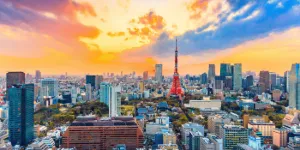The SilverDoor Blog
SilverDoor's Market Update - February 2025
Relocating to Singapore? Here’s everything you need to know before you move
Relocating isn’t always easy, especially when it involves relocating for work. Whether you’re moving alone or with family, the process can quickly become overwhelming. There's a lot to consider,...
Corporate Housing Trends in the USA - 6 key takeaways from CHPA Connect 2025 San Diego
The CHPA Connect 25 (Corporate Housing Providers Association) conference united over 550 industry professionals in San Diego, offering in-depth insights into stronger collaboration between property...
A Business Travel Guide to Tokyo
Staying in Tokyo, Japan Tokyo is a futuristic metropolis where cutting-edge technology meets centuries old tradition. Once named ‘Edo’, Japan’s political centre would eventually grow into one of...
Tried and Tested: Serviced Apartments in Manchester
Manchester is a lively city and one of our key destinations. With its thriving nightlife, and illustrious academic and professional scene, it’s no surprise that Manchester is such a sought location...
Expectations of Gen Z: The Business Travel Preferences of Tomorrow's Decision Makers
The era of Generation Z business travel is no longer a future consideration. Born between 1997 and 2012, Gen Z professionals already make up 27% of the OECD ‘high or upper middle-income countries’...
What role does ESG play in recruitment and talent acquisition?
ESG is a guiding principle which measures the various types of impact a business or organisation has on the world around them. E (environmental) refers to an organisation’s impact on the environment...
Relocating to London? Here’s everything you need to know before you move
Relocating to London is an exciting opportunity, but it can also be a complex process. From finding the right home to transporting all your belongings, we understand the weight that comes with...
Mind the Gap: Continuing the Neurodiversity Conversation in Corporate Travel
In a recent survey, we reached out to our network to better understand how the corporate travel and serviced apartment industries are currently supporting neurodivergent travellers—and the responses...
Celebrating a year of the Carbon Calculator
SilverDoor's game-changing industry innovation marks its first anniversary When we launched the SilverDoor Carbon Calculator a year ago, we had one clear goal to tackle a significant challenge in...
Loneliness: The Top Mental Health Concerns for Business Travellers and How to Tackle Them
Although business travel is exciting and a wonderful opportunity for personal and professional growth, it can sometimes feel isolating, especially when far away from loved ones. Research undertaken by...
Business Travel Trends 2025 - SilverDoor's Predictions for the Year Ahead
Business travel trends 2025 Insights from global events reveal key trends shaping 2025. Our SilverDoor representatives have actively participated in numerous industry events, gathering valuable...
The Best Serviced Apartments in London for Families
Moving your family somewhere new, whether domestically or internationally, can be a time consuming and stressful process. If you’re relocating and looking for a new home, a serviced apartment can be...
A Business Travel Guide to Birmingham
Staying in Birmingham, England Birmingham is the UK's second-most populous city and is a thriving hub of business and culture. Known for its impressive canals, industrial heritage and vibrant arts...
A Business Travel Guide to the City of London
Staying in City of London, England The City of London, colloquially known as the ‘Square Mile’, is a cornerstone of historical, fiscal and architectural renown. Not to be confused with London...
A Business Travel Guide to Bristol
Staying in Bristol, England Bristol. Originally known as a port city used for British trade, the city has adapted itself into a hive of media activity and creativity. Home to both ITV and BBC studios,...
SilverDoor's Market Update - December 2024
SilverDoor's Market Update is a comprehensive review of the global travel landscape using our own booking data, wider economic context, and our experts' experience and predictions to build a picture...
We asked our PR team what are the top five tips to making a property offering stand out?
Knowing how to make your property stand out against competitors can be challenging as there are many excellent properties. That’s why, as the world’s leading serviced apartment provider, we know...
Navigating Compliance in the Serviced Apartment Industry
What is Compliance? At its core, compliance involves following rules, laws or industry specific regulations, and is essential to ensuring the legal and ethical operation of businesses. But compliance...
Embracing Neurodiversity in the Corporate Travel Industry
This guide is structured to help you navigate the key insights on neurodiversity and travel. Click on the sections below to dive straight into the topics that interest you most: What is...
How an Industry Placement Can Change the Trajectory of Your Career
Firstly, what is an undergraduate placement? A placement is usually a 12-month paid sandwich year in your degree in which you gain real world experience working for a company. Unsure whether to apply...
Innovation and Sustainability: The Hidden Environmental Expense of AI Development
Artificial Intelligence is shaking up the business travel landscape, streamlining travel experiences, refining travel plans, and enhancing business service offerings. Global corporate travel is...
The FEM EMEA Summit - Five Points to Remember
I recently joined other travel industry professionals at the Forum of Expatriate Management – EMEA summit in London. This conference provides valuable insights into how the travel industry can...
Corporate Housing in Düsseldorf, Luxembourg, and Brussels
I recently visited several of our property partners in Düsseldorf, Luxembourg, and Brussels to ensure our portfolio meets the evolving needs of the modern business traveller. SilverDoor is...
Corporate Relocation Guide: Comprehensive Information for All Stages
Corporate Relocation Guide: Comprehensive Information for All Stages Corporate relocation involves transferring employees to new locations, often for extended periods. Corporate relocations are...








































